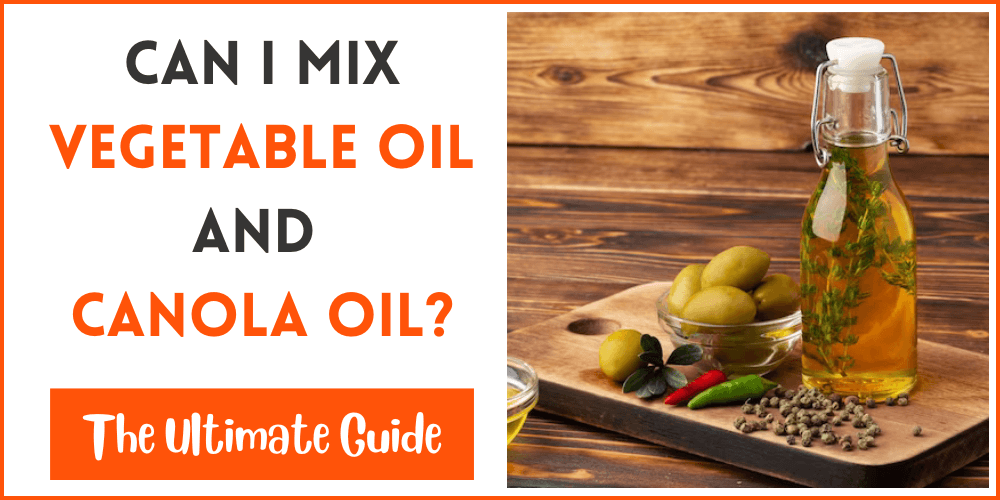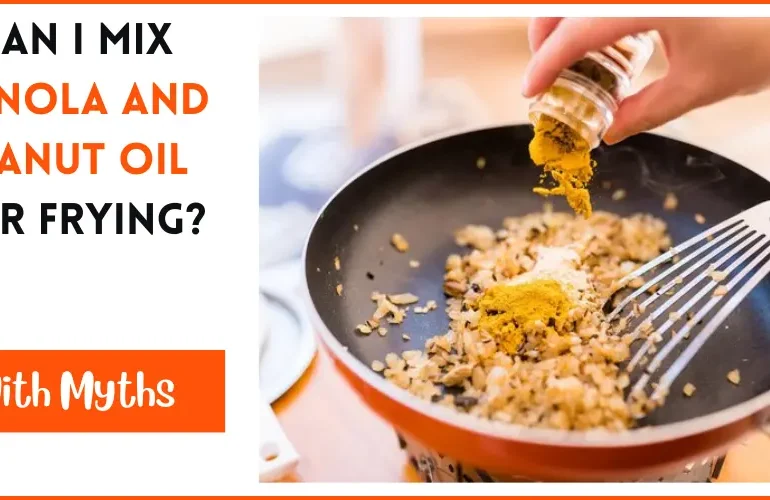

Cooking oils are a staple in every kitchen, playing a pivotal role in frying, baking, sautéing, or even dressing salads. Among the array of choices, vegetable oil, and canola oil stand as popular choices due to their versatility and affordable price point. Is it safe, and can I mix vegetable oil and canola oil? Let’s dive into the fascinating world of culinary oils and explore these questions.
Can I Mix Vegetable Oil And Canola Oil?
Yes, you can mix vegetable oil and canola oil without any issue. Both oils are commonly used in cooking and have similar properties. They are often interchangeable in recipes, and combining them will not result in any adverse reactions.
Before we delve into can I mix vegetable oil and canola oil? It’s essential to comprehend what these oils are and how they vary.
Composition And Sources
Vegetable oil is a generic term referring to a blend of various oils derived from different plant sources such as soybeans, corn, or sunflower seeds.
On the other hand, canola oil comes specifically from the seeds of the canola plant, a genetic variant of the rapeseed plant.
Smoke Point And Stability
A vital aspect to consider while choosing cooking oil is its ‘smoke point’ – the temperature at which the oil starts to smoke and degrade, producing harmful compounds.
Canola oil has a relatively high smoke point (around 400°F), making it suitable for various cooking methods, including frying and sautéing.
Vegetable oil, depending on its blend, typically also has a high smoke point, making it a popular choice for deep frying.
Flavor Profiles
Flavor-wise, both vegetable oil and canola oil are considered neutral and do not drastically influence the flavor of the food, making them versatile for cooking.
Effects On Taste And Texture
When mixed, vegetable oil and canola oil maintain their neutral profile, leaving the flavors of your ingredients to shine.
In terms of texture, the blend will behave similarly to using them separately, lending a crispy exterior for fried foods or a moist crumb in baked goods.
Health Implications
Nutritionally, both oils provide essential fatty acids and vitamin E. Canola oil is renowned for its low saturated fat content and higher monounsaturated fats, making it often touted as heart-healthy oil.
Vegetable oil’s nutritional profile varies based on the blend, but it generally has a higher saturated fat content than canola oil.
Appropriate Uses In Cooking
- Frying With Mixed Oils
For frying, this mix can offer a high smoke point, ensuring the oil remains stable at high temperatures. This helps achieve a golden, crispy exterior on your fried foods without the risk of producing harmful compounds. - Baking With Mixed Oils
In baking, the blend can help create moist and tender baked goods. Also, their neutral flavor won’t overshadow the taste of your ingredients. - Other Cooking Methods
You can also use the mixed oil for sautéing, roasting, and grilling, or as a base for dressings and marinades.
Recipes And Cooking Tips
Now that we’ve established that can I mix vegetable oil and canola oil? Here are some practical ways to incorporate this blend into your cooking.
Recipe
A simple stir-fry is a great way to start. Mixed oil provides the high heat tolerance needed for quick cooking while allowing the flavors of your ingredients to shine.
Frying Tips
When frying, ensure your oil is hot enough before adding food. Adding food to lukewarm oil will result in soggy, oil-soaked dishes. Also, avoid overcrowding the pan, which can drop the oil’s temperature.
Baking Suggestions
For baking, ensure you follow the recipe’s recommended oil quantity. Overly increasing oil can result in a dense or greasy outcome.
Storing Mixed Oils
Store your oil blend in a cool, dark place and use it within six months for the best quality.
Related Guides:
Is It OK To Mix Cooking Oils?
It’s perfectly safe to mix cooking oils. Mixing oils like vegetables and canola can even unify the best qualities of both, providing a high smoke point and neutral flavor profile. However, it’s crucial to consider the nutritional profile and intended cooking method for the optimal result.
Is It Better To Fry With Canola Or Vegetable Oil?
Both canola and vegetable oil are suitable for frying due to their high smoke points. However, canola oil may have a slight edge for health-conscious individuals due to its lower saturated fat content and higher proportion of heart-healthy monounsaturated fats.
What Is The Healthiest Oil To Cook With?
The healthiest oil to cook with is often considered to be olive oil, due to its high content of monounsaturated fats and antioxidants. Additionally, extra virgin olive oil has a relatively high smoke point, making it versatile for various cooking methods, including sautéing and roasting.
Can You Mix Canola And Olive Oil For Deep Frying?
You can mix canola and olive oil for deep frying. The blend combines the high smoke point of canola oil and the robust flavor of olive oil. However, this should be done mindfully, considering olive oil’s stronger flavor and higher cost compared to canola oil.
Conclusion
Mixing vegetable oil with canola oil is not only safe but can also serve as a versatile cooking medium in your kitchen. Whether frying, sautéing, or baking, this blend could be your secret to delicious meals. As a question raised: can I mix vegetable oil and canola oil? Remember, while these oils have beneficial properties, they are still fats and should be used judiciously in a balanced diet. So, let your culinary creativity soar, and experiment with this mix in your next cooking adventure!
References
- By Ariel Knutson, Canola Oil vs. Vegetable Oil: What’s the Difference? Published on on January 25, 2022.
- By Lisa Cericola, Canola Oil Vs. Vegetable Oil: Which One Should I Use? Updated on October 31, 2023.
- Vegetable Oil vs Canola Oil: The Ultimate Verdict



